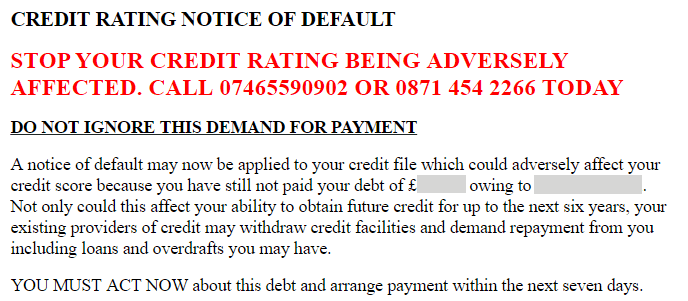A reader asked:
My previous electrician has hired a debt collector, Guardian Recovery, to chase me for money for additional works never carried out. He refuses to engage with any meaningful discussion. I have now received an email from Guard Rec saying a notice of default may now be applied to my credit file. Can I actually receive a NOTICE OF DEFAULT on my credit report via a private dispute without a court ruling etc?
This article looks at whether this threat to add a default for this debt could ever be carried out and the more general question of debt collecting tactics.
Here is an extract from the email that Guardian Recovery sent:

Can a default be added for this debt?
No. There are a whole range of debts which are not regulated debts, including disputes over work done on your house or garden, gym memberships, nursery school fees, hairdresser’s bills, restaurant bills etc. These will never appear on a credit file.
If you are taken to court for this sort of debt and lose, the CCJ will appear on your credit record, but the debt itself doesn’t and a default for that debt can never be added.
I asked Experian if they could confirm this and they did, saying:
“Debt Collectors should only report debts to the Credit Reference Agencies relating to credit (loans, credit cards etc) or to a type of debt that would be eligible to be on a credit report in its own right such as utilities. So even though we have some of the main DCAs supplying default data to us, these debts will relate to amounts originally owed to other firms that are regulated within the credit industry. Of course, if any debt was subsequently pursued through the courts and a judgment obtained then that would appear on the credit report.”
Are debt collectors allowed to threaten something they can’t do?
No – see this 2014 government leaflet on Misleading and Aggressive Practices, which specifically mentions debt collection as an area which is covered, saying:
“The Regulations expressly cover all commercial demands for payment. Debt collectors acting aggressively and [who] receive the consumer payment on their own behalf would be covered as “traders”. If the debt collectors are acting as agents of a trader, the claim would instead be against the trader.”
I wonder if the electrician in this case realises he could be legally responsible for the actions of this debt collector?
It’s worth noting the Ferguson v British Gas case, where the Supreme Court decided that threats to harm someone’s credit record were serious.
Guardian Recovery’s “Service Level Agreement”
On Guard Rec’s website, its Service Level Agreement states: “We promise that in a period of 128 days we will contact your debtor a minimum of 75 times.” That sounds close to harassment to me, especially if some of the communications are misleading, suggesting that the debt collector has powers they don’t possess.
You do not have to discuss an alleged debt with a debt collector if you do not want to.
Of course if you do owe the money it normally makes sense to try to come to an arrangement with a creditor. But if you would rather argue the case in court – and that is what the reader who has a dispute with her electrician wants – that is your right.
So what should the reader do?
Well she could just ignore Guard Rec. But after a few days of repeated contacts she said to me, rather politely I thought, “They are now officially annoying.”
So the simple approach is to reply to one of their emails saying the debt is in dispute and you do not wish to receive any more communications from them. If they continue to contact you after this, I suggest you go to your local Citizens Advice or a Law Centre and ask for their help to get this to stop.
If you are feeling cross about receiving these misleading threats, there are other steps you could take. Even if you dealt with this quite easily, there will be other people who are more vulnerable so you will be being a good citizen by making sure the authorities are aware of this behaviour.
A simple one is to report them to Trading Standards using the Citizens Advice consumer helpline to do this.
Many of the better debt collectors belong to professional associations which have codes of conduct – you should be able to see this from the debt collector’s website. If they are, check the association’s Code of Conduct and report the debt collector to the association for any breaches. Unfortunately Guardian Recovery doesn’t appear to belong to one.
You could also check if they are authorised by the Financial Conduct Authority – this may be on the debt collector’s website, if not then check the FCA register – Guardian Recovery is. In this case you could inform the FCA about the conduct of one of their authorised firms. Although this sort of debt is not regulated by the FCA so the detailed CONC rules don’t apply, some of the FCA’s general principles apply to the whole firms’s business e.g. “A firm must conduct its business with integrity.” It’s hard to imagine how issuing misleading threats is consistent with this.
So you could inform the FCA about the debt collector’s actions by emailing them at consumer.queries@fca.org.uk. The FCA won’t talk to you about this email – they don’t look into individual complaints – but it helps them get a picture of the actions of the firms they are authorising. A possible email could look like:
I have received emails / texts / phone calls from them saying that they can add a default to my credit record for an alleged debt to a builder/nursery school/whatever and that this will harm my credit record. This is misleading and threatening – it isn’t possible for a default to be added to my credit record for this type of debt which is not regulated.
Although you do not regulate this type of debt, I thought you would want to be aware of the actions of this firm which it seems to me is failing to act with integrity in its business.
[add any other information for example if you also feel you have been contacted an unreasonable number of times, after you asked for contact to stop, or at unreasonable times of the day.]
your name and address
No comment from Guardian Recovery
I asked Guardian Recovery if they would like to comment on why they are sending these emails, but so far they have not replied to me.



Leave a Reply